

David Lowe
War is probably as old as humanity.
The natural world is much older, of course, but it’s been damaged and affected by human conflicts since we first started killing each other.
Historically, forests were cut down to build armadas (in Spain), salt was sprinkled on fields as a weapon of war to render the land uninhabitable (by ancient Romans and Assyrians) and entire landscapes were smashed beyond recognition in World War I.
Then World War II came along, and the problem became exponentially worse. 75 years since the end of that conflict, it’s become clear that wars between humans are also wars waged against the biosphere which sustains us.
Catch 22 and then some
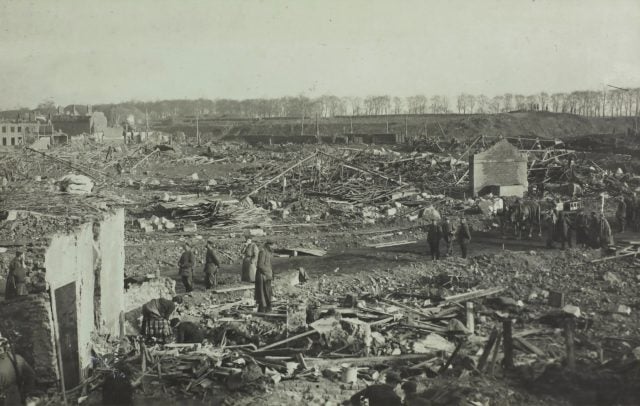
A wicked aspect of the problem is that wars – large and small, hot and cold – cause environmental damage, and that damage leads to further wars.
‘Scorched earth’ military practices destroy the environment so that it can’t support the enemy, whoever they are. Unfortunately, anything else living there is also killed.
In what’s been called the ‘largest act of environmental warfare in history’, the Nationalist Chinese government in 1938 deliberately breached Yellow River levees, drowning many invading Japanese soldiers but also a massive number of Chinese peasant farmers.
The human death toll was 800,000, and thousands of square kilometres of land was flooded and destroyed, creating nearly 10 million refugees.
A more recent (and literal) example of scorched earth is the deliberate burning of the Kuwaiti oil fields, documented in the memorable Werner Herzog film Lessons of Darkness.
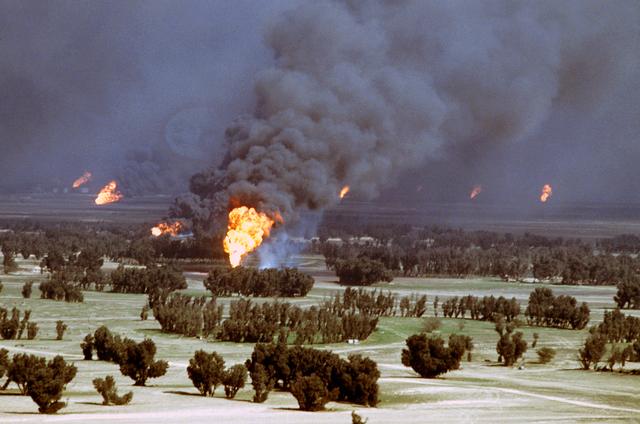
Throughout history, when war has put refugees and armies on the move in large numbers, environmental destruction has been the first consequence, both in the form of introduced plants and animals, and stripping of country for food, shelter, and the materials for further warfare.
Animals and plants have been pushed towards extinction by this process.
Examples include the inhabitants of Akegera National Park during the Rwanda conflict, those of Laysan Island in the Pacific in WWII, and elephant, rhino and primate populations in the Sudan and Democratic Republic of Congo during the fighting there.
Short term desperation thinking in humans is a disaster for the natural environment, because sustainability is the last thing people think about when immediate survival is at stake.
The heat is on
Climate change has worsened and complicated the situation. The conflict in Syria, for example, is thought to have originated because of crop failures due to climate change. Likewise the conflict in Darfur.

What looks from the outside like a religious or racial dispute often boils down to resources, which come into short supply because of previous conflicts, or climate change, or both.
Unfortunately, the biggest armed forces of the world are actively making the climate emergency worse, even when they’re not fighting.
Consider the fact that the US military is the world’s single largest consumer of oil, buying over 269,000 barrels of oil each day. The US Air Force alone purchased US$4.9 billion worth of fuel in 2017.
While exact figures are hard to come by, and other countries are far from innocent, the US Department of Defense has been described as ‘both the nation’s and the world’s largest polluter’, producing more hazardous waste than the five largest US chemical companies combined.
Then and now
A little over one hundred years ago, the ‘war to end all wars’ saw unprecedented use of machinery to aid humans efforts to kill one another, but despite the extreme savagery of those battles, many of their locations in Belgium and France are now productive farmland, probably helped more than anything by the additional fertiliser.

Subsequent wars are a very different story, with new killing technologies such as nuclear weapons and Agent Orange (20 million gallons of the herbicide was used in Vietnam alone) causing ongoing environmental and human catastrophes.
The residues of war are increasingly toxic.
A classic example is depleted uranium. Originally developed for its armour piercing abilities (and as a market for nuclear waste), DU is continuing to cause birth defects and cancers years after its use on the battlefield, both in soldiers and civilians.
Less exotic heavy metals such as lead are also long term toxic by-products of war, causing serious health effects in humans and other species.
Nuclear weapons testing has caused disastrous long term impacts on country and on many indigenous people, from the South Pacific to Nevada, and from Kazakhstan to Australia.
Conventional military training also has negative environmental consequences, such as at Shoalwater Bay, in Queensland.
In Iraq, desertification caused by warfare is now forcing the country to import 80% of its food.

PFOS and PFAS substances, developed for firefighting by 3M and Dupont, and highly toxic in minute quantities, are leaching from military airfields into surrounding suburbs and ecosystems around the world.
Affected sites in Australia include Williamtown near Newcastle, Oakey in Queensland and the Tindal RAAF base near Katherine in the Northern Territory.
There is research that whales are being killed and disrupted by military submarine communications technology, and the oceans are also being hammered by massive quantities of military waste, including nuclear waste.
Always look on the bright side of death
Paradoxically, the military’s ultimate need to deal with reality – rather than the fantasy worlds of politicians and economists – has the potential to become a force for good even as our species’ self destructive streak reaches entirely suicidal (and ecocidal) dimensions.
Senior military figures in the US are pretty much the only public servants in that country who have ignored the current president’s orders to scrub the climate change emergency as a major concern.
Naval bases are threatened by rising seas, and the climate emergency also presents a clear and present danger to food and water supplies, leading potentially to mass movements of people beyond the ability of military forces to control them.
It’s been suggested that framing the climate emergency as a national security emergency, and not just an environmental issue, might change the way many conservative people feel about it, and what they’re prepared to do in response, including the uptake of renewables.
In 2019, a leaked speech of Defence Force Chief General Angus Campbell showed that the Australian military is well aware of the increasing climate risks, even as its political masters continue to pretend otherwise.
The speech noted that Australia is in ‘the most natural disaster prone region in the world’, with ‘climate change predicted to make disasters more extreme and more common.’
Even if motivated primarily by strategic reasons, (and a little weirdly for an organisation that spends most of its time and energy securing oil supplies) the US military is spending up big on renewable energy, as well as electric tank, ship and drone technology, somewhat reducing its enormous environmental bootprint.
The American academic Sarah Light has written about what she calls the ‘Military-Environmental Complex’, describing her nation’s military as being ‘engaged in an extensive undertaking to improve its sustainable energy use by reducing demand and developing renewables in its multiple roles as a war fighter, a landlord, a first user of pre-commercial technologies, and a potential high-demand consumer.’
Many technologies developed originally for military use, and with military funding, have become useful and ubiquitous parts of many people’s lives, as well as vital tools for environmental and peace activists. Examples include GPS, drones, and the internet.
As a pointer to what is possible globally, armies have been used in major reafforestation programs in places such as Pakistan, India and Venezuela, and portable renewable tech developed for so-called ‘smart camps’ by the military has the potential to revolutionise civilian life, especially for the poor and homeless.
War eats the world
In spite of these feel good stories though, recent reports of Indian and Chinese troops killing each other with primitive weapons in the disputed mountain territory between their nations is a reminder that our world remains on the brink of annihilation, as it has been since the Cold War.
Both these countries have nuclear missiles, and they are part of a growing nuclear club which now includes Israel and North Korea.
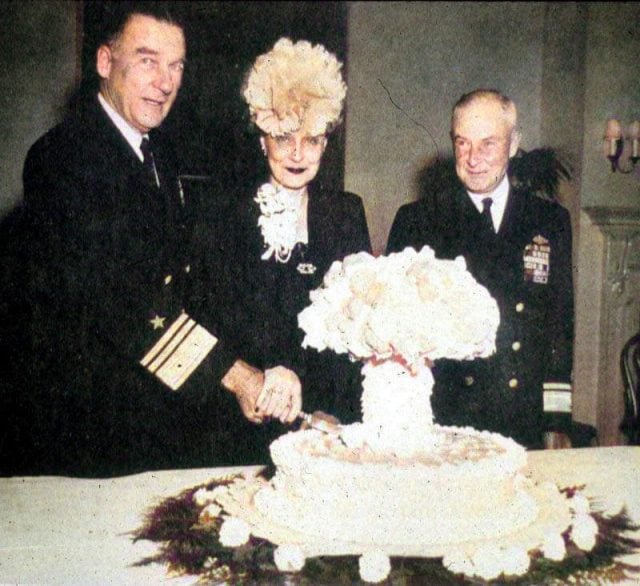
The Doomsday Clock stands at 100 seconds to midnight.
In spite of the pressing survival issues on our planet, vast quantities of resources (and lives, human and otherwise), continue to be poured into the global war machine, to little or no quantifiable military result.
Vietnam, Afghanistan, and Iraq are a few obvious examples. The only winners are the weapons-sellers and their political friends.
The US President is rolling back arms treaties, and wants to buy more nuclear weapons.
In Australia, $270 billion has recently been found from somewhere for the military, to buy long range missiles amongst other war machinery. This will further destabilise our region while offering no guarantees of security.
Meanwhile some human victims of the recent climate-fuelled bushfire crisis are still living in tents, and over a billion native animals are dead.
The priorities of our ‘leaders’ are clear.

Author
Originally from Canberra, David Lowe is an award-winning film-maker, writer and photographer with particular interests in the environment and technology. He’s known for his work with Cloudcatcher Media as a campaigner against unconventional gas and coal.
David has also written about Australian history. Many years ago, he did work experience in Parliament House with Mungo MacCallum. David has lived off-grid in the Northern Rivers since 2008.
More Planet Watch articles
Will Morrison’s gas-led recovery delete the IPCC’s belief we need climate...
Most Australians know the news, or have had firsthand experiences themselves, of two years of floods, fires, coastal erosion, and storms, both here and overseas. In fact Australia has warmed on average by 1.44 ± 0.24 °C since national records began in 1910.
‘Unprecedented’ but not unpredicted – we are now suffering from our...
As Australians head into another election season just as many parts of the east coast are recovering from ‘unprecedented’ flooding since February, and the national psyche is still reeling from the trauma of the ‘unprecedented’ Black Summer bushfires before that, it is critical now more than ever to vote according to your environmental conscience and fear for the future.
Ethical investing goes prudential
Ethical investing is the idea of using your money to make the world a better place rather than simply chasing the greatest financial return. It seeks to account for people and planet, not just profit.
On track to three degrees of warming
Our planet has warmed by 1.1 degrees, on average, since the Industrial Revolution, and Australia has warmed by 1.4 degrees since 1910 when records of temperature measurements began.
What’s going on with gas?
David Lowe According to the prime minister, we’re in the midst of a ‘gas-led recovery’. Until about five minutes ago, the gas in question was methane (mostly found using unconventional techniques like fracking) but now he’s also talking about hydrogen,...
Is hydrogen part of a sustainable energy future?
There’s a lot to like about hydrogen. For starters, it’s abundant. Hydrogen can store excess renewable power. When liquified, it’s more energy intense than fossil alternatives. In a fuel cell, it can generate electricity. When it’s burned, the only by-product is water.
Human activity, climate change risk more pandemics
New research has revealed climate change, environmental degradation and human activity are creating a perfect storm for more deadly pandemics like COVID-19. Scientists from the University of Western Australia (UWA) say COVID-19 has highlighted the critical need to reduce human impacts...
Planet Watch: Environmentally sound building
Globally, buildings are responsible for a massive share of energy and material consumption. Sustainable building movements are trying to change this, some by going back to the past, and some by diving head-first into the future.
Planet Watch: Are humans the disease?
Humans have told a lot of stories about how awesome we are, but there's one emerging hypothesis that casts our species in a very anti-heroic light. In terms of the planet, are we behaving like a disease?
Planet Watch – Top three environmental issues
With so many environmental crises occurring, it’s hard to focus on just three issues to provide an update to Planet Watch readers – but here's our top three...







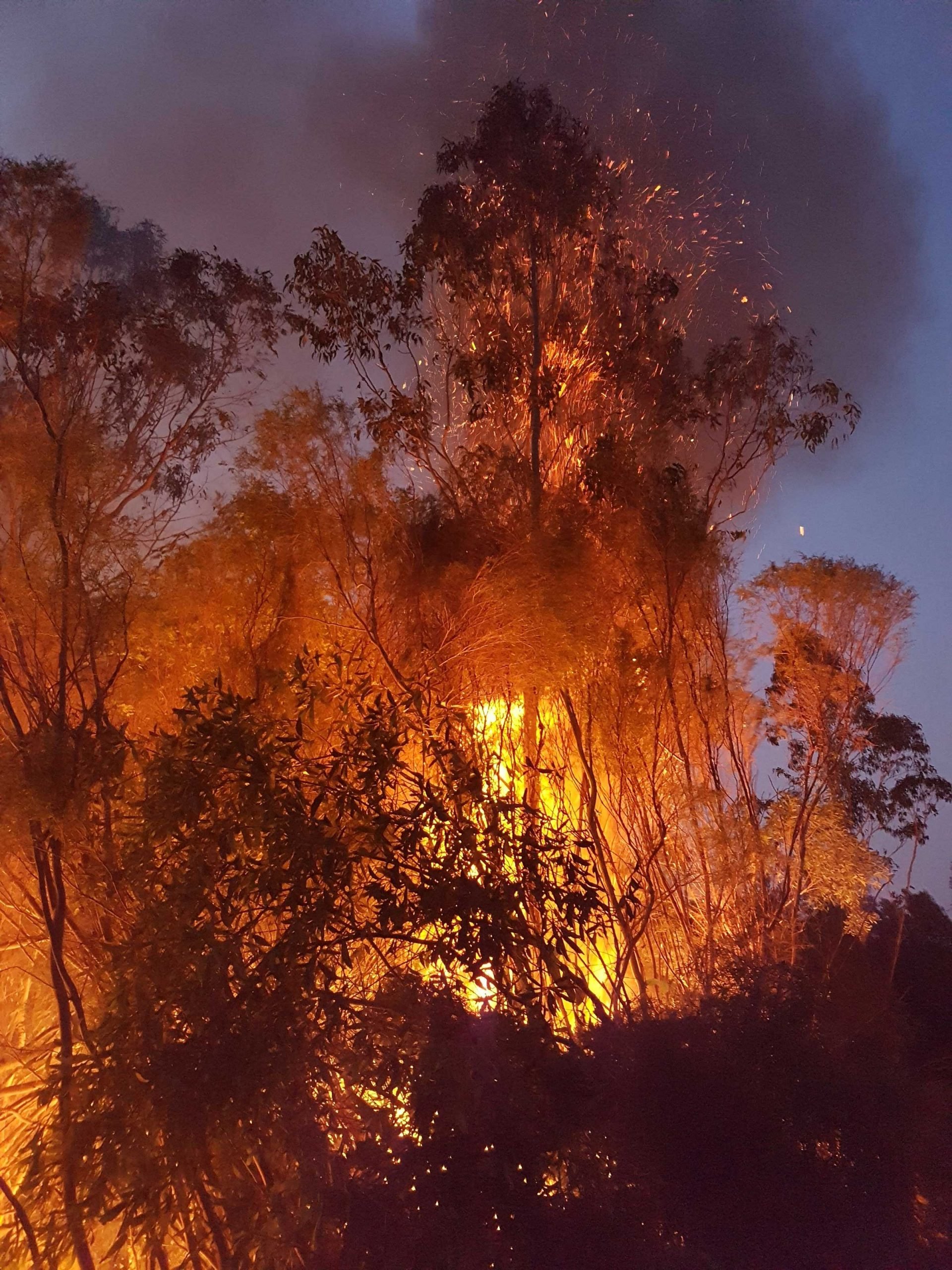


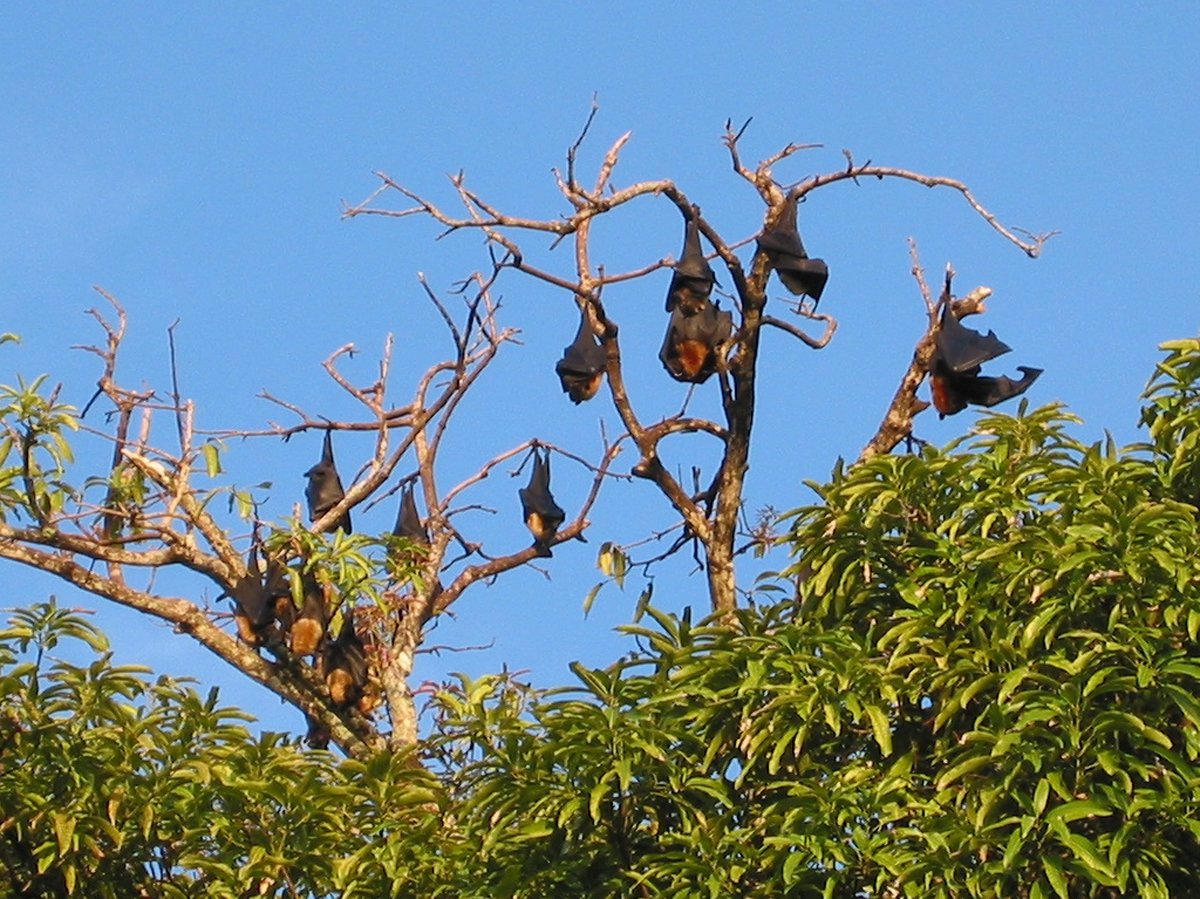




Shallow and simplistic definition of war, which is so much older an ecological funtion than mere humanity.
Yes Land clearing worldwide is a problem including Wind farms !! And of course without the safe use of insecticides on grops the world would starve Or put it this way less food would be available..Regarding climate change David , well we all Need to minimize our carbon footprint on earth Yet the very people who call out Global Warming Are some of the worst offenders, with all the privilege’s that come with iron ore , coal … Do as i say not as i do mentality . Whats good for us is not for you !! Hypothetical ? Well absolutely. However you wouldn’t expect anything different.. And lets not forget and our own Shire council has declared a Climate emergency But cannot explain or provide a reason as to why.And of course you have Kevin Rudd, Tim Flannery Uh 🤣we are all going to be swallowed up by the RisIng sea levels. Both live on the water …99 % of the Science is settled on climate change David .. said who ?
…”said who?”, Barrow. The scientists, that’s who, But then you already knew that, it’s just that you choose to ignore the Science and stay the course with your Denialism.
Dont you start Captain Planet Joachim !!
You are incapable of any proof regarding Global warming of any kind ..just ask the scientists .
You are as delusional as YOUR Tim Flannery
Its amazing that people like you the ABC
The Guardian has said nothing regarding
Flannerys FAILED predictions and other scientists throughout the world… listen to the science
Listen to the science , we tried Joachim
As we had no choice because we were PAYING
YOUR SCIENTIST FLANNERY to give advice
On Global Warming… ( 300k ) us quite
Ones have had enough of your stupid Greens
And the likes of Flannery, Rudd etc… Flannery
Should apologise to the Australian public …
Still waiting for ONE EXAMPLE OF THE SHIRES
CLIMATE EMERGENCY DECLARATION
Joachim???? You are the one in denial!!
The Barrow is baaack. No doubt you been very busy checking out the current affairs of the Arctic region, yes. Climate Emergency….facts Barrow!! Case Closed.
Example Joachim ?? Of this Climate Crisis
YOUR Greens Brandt & co so push as a Emergency
Not to Mention your Flannery.. lame Joachim
Very lame !!! FACTS you have Zero … Quite
Embarrassing really especially as you are so
Passionate and indoctrinated by this hysteria..
Well presented, David. ‘War & the Environment’;
you can’t have one without the other. For the
last 7 years I’ve been well ‘in touch’ with the
victims of Agent Orange & Monsanto & Dow
Chemicals & the publication ‘Homing’ that
covered the war in Vietnam & the effect it had
on the enlisted & the vet-by-numbers game.
The world’s not cruel. Governments’ are. And
Pine Gap’s a hidden killer that will emerge as
sure as time goes by before it stops. Thanks
for the work & time you put into your articles.
Good article, simple and succinct Unfortunately Australia is following the US into a War Based Economy at an ever increasing rate, thanks scomo
Typo – read HOMECOMING not homing. Mark’s
got it. The last thing we need is a ‘war based’
economy.
I am NOT…..a fool, Barrow. Neither are those you
attack just for the hell of it. Some information for
your list of what you think you know:
[1] – French court – Monsanto guilty of poisoning
farmer – 11/4/2019
[2] Monsanto [ie, Roundup] class action in many
courts.
[3]Monsanto (cancer couple) ordered to pay 2
billion
[4] Monsanto now owned by Bayer controlling all
seed brands
[5] Bayer & Monsanto merge
[6] Bayer’s GMOs Genetically Modified Foods…
[a]Dow Chemicals… made ‘mustard gas’
[b]Napalm – used in Vietnam
[c]Dow is – one of several makers of Agent
Orange
[d]Dow settled Class Action on Agent Orange at
$180 million
[e]In 1995 Dow calls / bankrupt due to Lawsuits
[f]by 2005 Vietnam victims of Agent Orange filed
against Dow Chemicles & Monsanto
N.B. Dow is now with Dupont – DowDuPunt.
Jean Williams’ books on Vietnam are worth a look at.
As well, we have to quit following everything the US
does & doesn’t do. We need to realize that others
have a right to state an opinion other than yours,
Barrow.
Hi Stefanie, should we now also mention DuPont and their Teflon or Monsanto / Bayer and their Roundup. How comforting it is that Big Chemical is always there for us, ready to unleash their latest poison to take us down.
Feel free to mention all of them, Joachim.
The mongrels hold the world-rights to the
world’s seeds. Any wonder the tomatoes
taste like crap, along with bananas [yuck],
potatoes, mint & anything you’d fling into
a salad. What’s more – the farmers are
fined if they try to use seeds from their
original stock. Big Brother’s watching
you. Eat up your genetically modified
vegies!